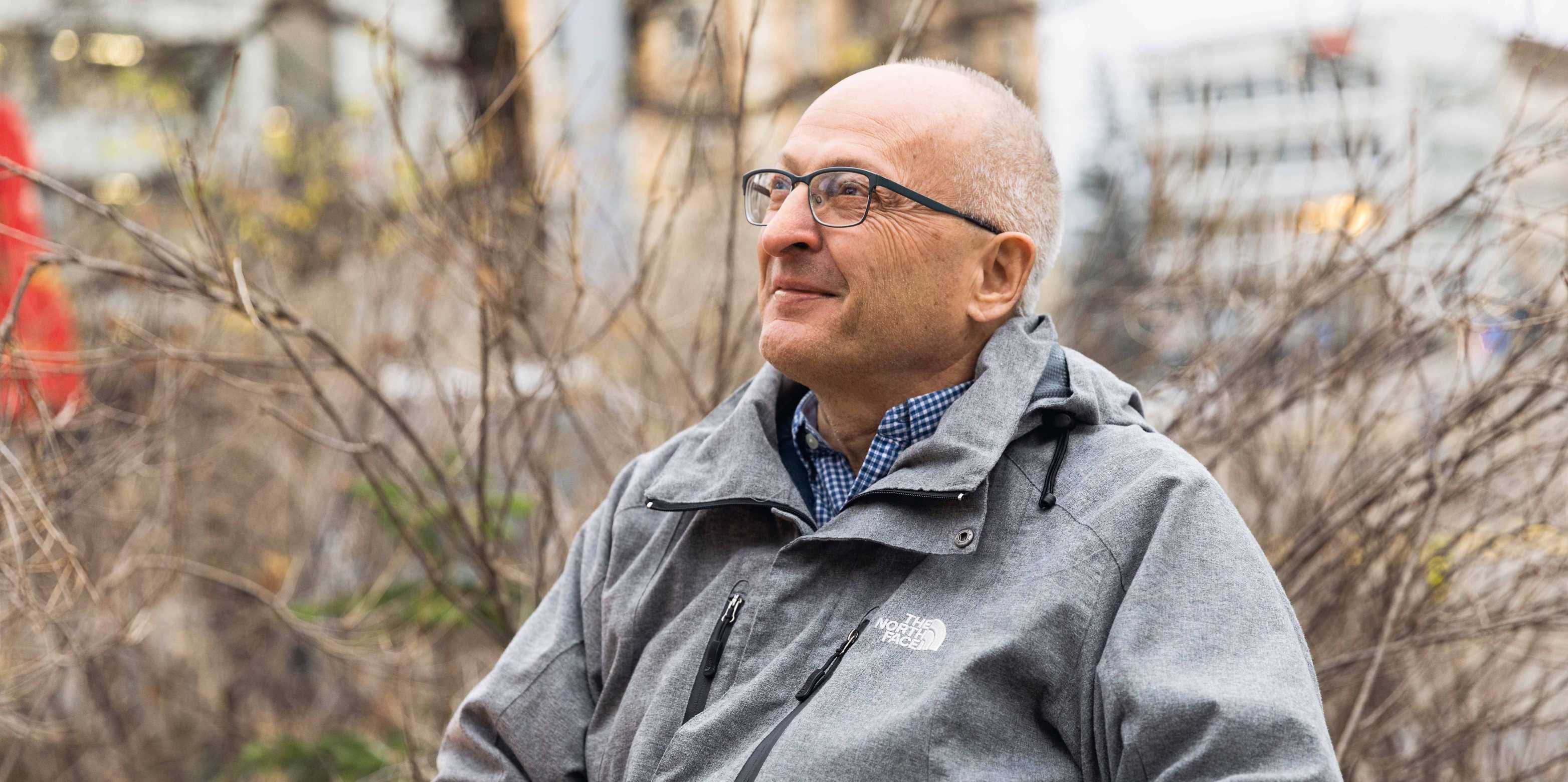A life in development aid
Peter Schmidt has been working in development aid for over 30 years, constantly seeking ways to help people help themselves. His first visit to India left him in shock for three days – but ended up shaping the rest of his life.

At first glance, you wouldn’t think Peter Schmidt had led such a well-travelled life. With his white cropped hair, checked shirt, tailored trousers and soft voice, he hardly seems like the adventurous type. But ask him about his time in India, Kyrgyzstan and Myanmar, and his eyes light up. A life filled with memorable experiences has made him a fulfilled and happy man.
The sound of poverty
The turning point in Schmidt’s life came on his first visit to India, as part of an extended internship for the agricultural science degree programme at ETH Zurich. He and his fellow students had already completed an initial stint on Swiss farms, and now they were expected to spend a few weeks in a very different environment. The year was 1986, and Schmidt’s destination was the state of Kerala in southern India – but his arrival in the regional capital of Trivandrum (now Thiruvananthapuram) left him in a state of shock. He took refuge in a Swiss colleague’s house and didn’t emerge for three days. “That’s how long it took me to process the flood of new impressions,” he recalls. From that moment on, he would forever associate poverty with one specific sound: “It was the clanging of hammers wielded by hundreds of Indian women sitting by the roadside. They were smashing up rocks to build roads – the kind of work I would have expected a gravel works to do.” He was overwhelmed by the huge crowds and the overpowering odours of cooking, spices and excrement.
Just 26 at the time, Schmidt felt completely out of his depth – but the experience was to shape his life. During this first visit, he worked on a livestock farming project for the international development organisation Intercooperation. “We visited various villages, spending some time in each talking to the locals and helping them with their work,” he says. He provided advice on animal husbandry to farmers and their families and carried out some basic field trials of feed crops. Like his hosts, he slept in a bare room, using a bucket for a shower and a hole in the yard as a toilet. Schmidt soon realised that the farmers’ main handicap was a lack of vocational training – and that development aid is a complex business. He also realised that he had found his calling.
Short hiatus
Schmidt returned to Switzerland to complete his degree programme, but he was soon on his way back to India for another Intercooperation project. His destination this time was Orissa, now Odisha, one of the country’s poorest regions. With him was his wife, Käthi Hüssy, and their one year-old daughter, Zarah. “Our town had 100,000 inhabitants, but apart from my boss, his wife and an English nurse, we were the only foreigners,” says Schmidt. He and his wife threw themselves into learning the local language, Oriya, but getting to know the locals was far from easy.
“Professionally, though, it was an incredibly enriching experience,” he says. “We looked at what farmers needed and came up with projects to help them.” Milk production was one area where their help was particularly useful. The locals keep cows primarily to provide manure for their crops, but it only took a few simple tweaks – such as feeding them the right diet – to get them producing more milk. “Of course, that means you immediately need a cold chain and distribution system," adds Schmidt. "Those were the kind of things we provided support with as we became more attuned to the farmers’ needs.”
After three years in India, the family returned to Switzerland. They quickly settled back in and found their daughter a place at nursery. Schmidt became a trainer in agricultural extension, educating farmers to apply scientific research to agricultural practices – including on short trips to Albania and Zimbabwe. But it wasn’t long before he and his ethnologist wife were heading off again, this time to Kyrgyzstan. “We were itching to experience another culture and broaden our horizons,” he recalls. The family moved into a small house in Kyrgyzstan’s capital, Bishkek, and sent Zarah to a private school, where the main language was Russian. Schmidt acknowledges that their daughter found the new language challenging at first, but her Russian skills would eventually pave the way to her current position as a diplomat. “It was a great time for us as a family. We had a high quality of life and close ties to the expat community,” he says. Schmidt was also doing well career-wise: as part of a Helvetas project, he established an agricultural advisory service similar to Switzerland’s cantonal extension services. This provided much-needed development support to the country following the collapse of the Soviet Union.
Three years later, it was time to return to Winterthur. “We wanted our kids to spend their teenage years in Switzerland,” says Schmidt. The children had friends in Bishkek, he says, but couldn’t see them unless he or his wife were willing to drive them halfway across the city. “Life in Switzerland gave our kids more freedom and independence,” he adds. He spent the next 14 years working for Helvetas in a number of roles, including as Regional Coordinator with a liaison role between donors and aid-receiving countries, as Co-Director of the International Programmes Department and as Co-Director of Advisory Services. “I really enjoyed what I did, and it never got boring!” says Schmidt. His work would eventually take him to some 30 countries on four continents.
From democracy to coup
Nonetheless, he and his wife were becoming increasingly eager to embark on a new adventure, this time to Myanmar. In January 2017, they arrived in a country that was finally on the road to democracy after decades of military rule. “It was a fantastic time to be there,” says Schmidt. The country was entering a new era. Schmidt was in charge of a young, motivated, 50-strong team, and he was soon busy launching new projects – some aimed at fostering the fledgling democracy – and travelling back and forth across Myanmar.
Then came COVID-19 and a strict lockdown, followed swiftly by a military coup on 1 February 2021. Schmidt first heard about the coup in a phone call from his son in Switzerland. “Twenty minutes later, they cut off all the phone and Internet access,” he says. For two days, the country was in a state of shock, and then people took to the streets in their hundreds of thousands. “I’d never seen such huge protests,” recalls Schmidt, shaking his head. For a few days, the military let the demonstrations continue; then, they brutally suppressed them. “I’m still incredibly sad for everyone who lives there, for all my former colleagues. They had to watch their futures being obliterated in front of their eyes,” says Schmidt. The terror campaign unleashed by the military junta has so far claimed almost 3,000 lives, and many thousands more have been imprisoned and tortured.
Schmidt and his wife returned to Switzerland in July 2021 as planned, but this time they found it harder to settle in and meet people. “It all just happened automatically when we had kids because we had to find school places and get everything organised,” says Schmidt. But things gradually improved, and he now works in Helvetas’ modern open-plan office in Zurich, where he is currently preparing a feasibility study on producing rice with lower methane emissions in Peru. Nowadays, he avoids flying for environmental reasons. But his belief that people should be empowered to seize opportunities remains unchanged, and he is currently helping two Afghan migrants find apprenticeships.
About
Peter Schmidt studied Agricultural Sciences at ETH and went on to obtain a Master’s degree in rural sociology. He subsequently became a consultant at Intercooperation, which merged with Helvetas in 2011. Over the course of his 30-year career in development aid, Schmidt spent long periods living with his family in India, Kyrgyzstan and Myanmar, where he set up and led a variety of projects. He also worked as a consultant in around 30 other countries in Asia, Africa, Europe and Latin America. He is currently employed at the Helvetas office in Zurich, where he is responsible for various projects on socially just and ecologically sustainable value chains in agriculture.
Globe Emotional!

This text appeared in the 23/01 issue of the ETH magazine Globe.
DownloadRead whole issue (PDF, 5.4 MB)
